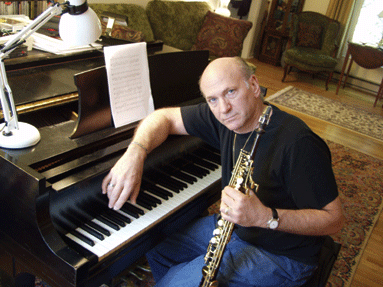|
Pre-20th century classical music is a style that admittedly was not a favorite of mine as I grew up. I did of course play some of the repertoire as part of my early piano lessons. Fortunately, with age comes the ability to appreciate music beyond genre characteristics. On the other hand, to perform and record music from the Romantic and Classical repertoire is another matter!
The chronology of Vienna Dialogues, my second saxophone / piano duo project for the ZOHO label, started in 2005 when I was invited to play with the wonderful Koehne String Quartet in Vienna at a very prestigious concert hall. We were doing an original composition by the Austrian classical composer Thomas Pernes which was based on the libretto of Schubert’s famous “Winterreise” song cycle. In preparing, I listened to the original work which is of course a classic in the German “lied” style.
Thomas Pernes who usually works in the contemporary vein, wrote a very tonal composition for string quartet and voice which transferred perfectly to the soprano sax. For 45 minutes, I played completely tonal, lyrical melodies with hardly any improvisation, just interpretation. It was a musical high moment of my past few years!! And it motivated me to pursue original “songs” from the Classical and Romantic era.
I thought that this would be the perfect project to do with a young musician who would put the time in, research the music and rehearse. Pianist Bobby Avey has grown up in the Pocono Mountain area where I have lived for the past 20 years. We have quite an active jazz community, with artists like Phil Woods, Urbie Green and Bob Dorough ensconced here for decades. Along with a wonderful educator, Pat Dorian who also plays trumpet in my New York based big band, there is an informal, but real master/apprentice situation happening in our area. Bobby is one of the most talented pianists I have known, and as I write these notes, he is finishing up his studies at SUNY Purchase College in New York - in the jazz department where he has excelled.
Though we did choose the material together, it was mostly Bobby’s input on arrangements. For example, deducing chord changes from the piano accompaniment is something that needs to be done for improvisation purposes. Over a one- year period, we rehearsed the music and performed it at Purchase College. With the help of National Public Radio producer George Graham, who has been responsible for the production of high quality music programs for 30 years at WVIA, the NPR station in northeastern PA, we recorded for the material broadcast.
George was incredibly patient and worked with us on the sound, the condition of the piano and of course the editing of the finished CD master. This was a real homegrown Pocono Mountains project, and I am thrilled that Jochen Becker from ZOHO could HEAR the music, once again beyond idiom and association. It is quite different for those familiar with my work, but in some respects it is merely another aspect of the piano-saxophone duet combination that I have been pursuing with a variety of partners for decades, most recently on ZOHO’s “Manhattan Dialogues” with Phil Markowitz.
There are several unique challenges in playing this music. Accuracy of pitch of course is crucial but more important from the aesthetic side, the challenge is to convey an emotional attitude culled from the written music while infusing it with one’s own personal set of inflections, guided above all by good taste. The balance between too little and too much is very precarious.
|
 Dave Liebman - at his home studio in Stroudsburg, PA, June 2005. Photo by Jack Frisch. Dave Liebman - at his home studio in Stroudsburg, PA, June 2005. Photo by Jack Frisch.
As well, if one considers that possibly the greatest contribution of the Western world to the art of music was the advent of harmony, meaning the choice of the “perfect” harmonic combination which will enrich and deepen the emotional content of a melody, the implications of performing such music run deep. These songs and their predecessors going back to 16th century composers Monteverdi and Palestrina are after all the foundation of the modern popular song, a style that grew in America in the 20th century and to which jazz owes such a debt. For centuries, the city of Vienna has loomed large in the history of Western music as a haven for artists and audiences to share the music.
There is a reason this music is called “classical.” It isn’t only a period designation, but on a deeper level, it is that these melodies and harmonies are “classic.” Everything works like clockwork, making one believe at least for a moment that there is beauty, order and perfection in the universe. This project therefore gives thanks to the great European musical masters for their major contribution to humanity.
Dave Liebman
Stroudsburg, PA USA
June 2006
Recorded at WVIA, Pittston, Pennsylvania, in Dec 2005. Recorded, mixed and edited by George Graham. Produced by Dave Liebman and Bobby Avey. Photography : Jack Frisch (Dave Liebman). Package Design : 3 and Co., New York. (www.threeandco.com) Executive Producers : Roger Davidson & Joachim “Jochen” Becker, Becker Davidson Entertainment. L.L.C.
Website Dave Liebman: www.upbeat.com/lieb/
Bookings : lieb@ptd.net Tel 570 476 5368
|

